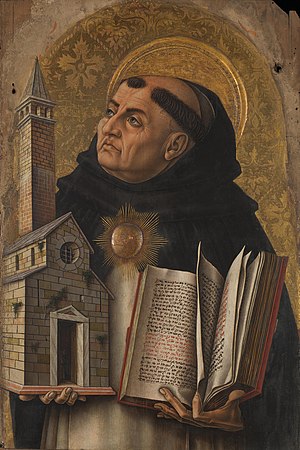[1]Thomas Aquinas OP (/əˈkwaɪnəs/, ə-KWY-nəs; Italian: Tommaso d'Aquino, lit. "Thomas of Aquino"; c. 1225 ⁇ 7 Kǝntawu Marchbe 1274), shiye Franciscan Franciscanbe lardǝ Italybe-a kuru Dominican friar-a kuru priest-a, falsafawu kuru theologian-a, kuru lamar sharabe suro adawa scholasticismbe lardǝ Aquinobe suro maiya Sicilybe-an.
Thomas Aquinas

human| Sex or gender | male  |
|---|
| Name in native language | Thomas Aquinos  |
|---|
| Given name | Tommaso  |
|---|
| Noble title | Doctor of the Church  |
|---|
| Nickname | Doctor Angelicus, Doctor Communis  |
|---|
| Date of birth | 1225  |
|---|
| Place of birth | Roccasecca  |
|---|
| Date of death | 7 March 1274  |
|---|
| Place of death | Fossanova Abbey  |
|---|
| Place of burial | Church of the Jacobins  |
|---|
| Father | Landulphe d'Aquino  |
|---|
| Spouse | no value  |
|---|
| Languages spoken, written or signed | Medieval Latin, Medieval Italian, Latin  |
|---|
| Writing language | Medieval Latin  |
|---|
| Field of work | philosophy, theology, Catholic theology  |
|---|
| Employer | University of Paris  |
|---|
| Position held | professor  |
|---|
| Educated at | University of Paris, University of Naples Federico II  |
|---|
| Student | Henry Bate of Malines, Remigio dei Girolami  |
|---|
| Student of | Albertus Magnus  |
|---|
| Honorific prefix | Doctor of the Church  |
|---|
| Residence | Aquino  |
|---|
| Lifestyle | mysticism  |
|---|
| Religion or worldview | Catholicism  |
|---|
| Religious order | Dominican Order  |
|---|
| Canonization status | canonized saint  |
|---|
| Feast day | January 28, March 7, Catholicism  |
|---|
| List of works | Thomas Aquinas bibliography  |
|---|
| Notable work | Summa Theologica, Summa contra Gentiles, De regimine principum, Quinque viae  |
|---|
| Named after | Thomas the Apostle  |
|---|
| Movement | Thomism, just war theory, scholasticism  |
|---|
| Has works in the collection | Victoria and Albert Museum, Huis Bergh, Museum De Lakenhal, J. Paul Getty Museum  |
|---|
| Copyright status as a creator | copyrights on works have expired  |
|---|
Thomas shima kam do ilmu alagǝwa nzǝa fǝlezǝna ma kuru shima malǝm ilmube (kǝla ilmu alagǝwa nzǝa kuru falsafabe) do sha Thomism lan nowotǝma dǝwo. Shiye kambiyizəna kəla Allah də shima asulu nurdo dalil alagǝbe-a nurdo kǝrmaibe-a.
